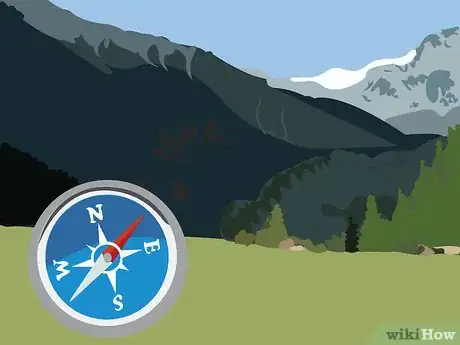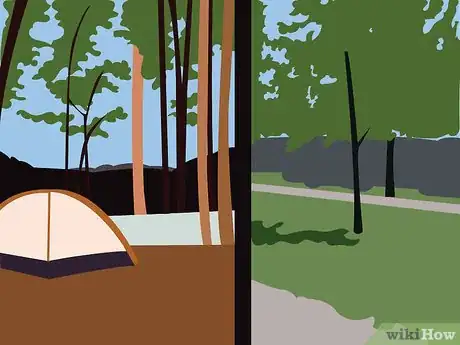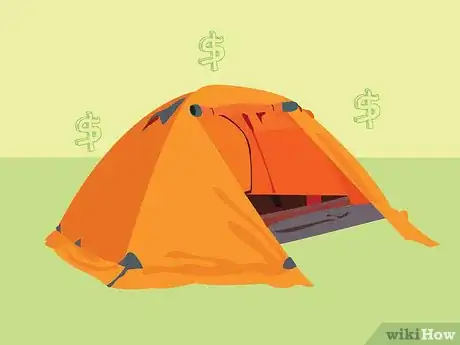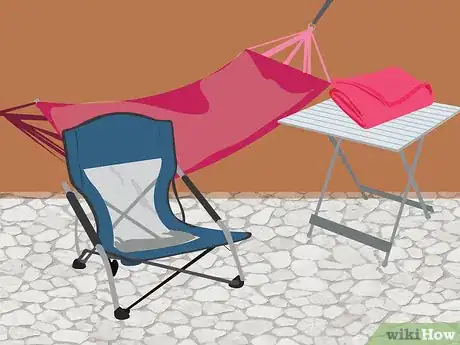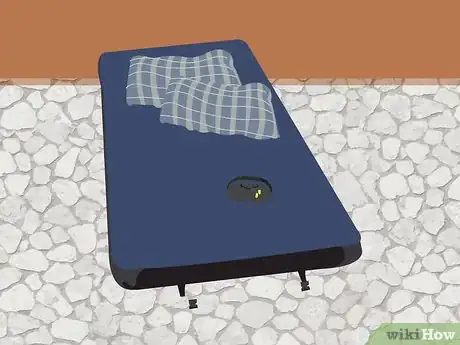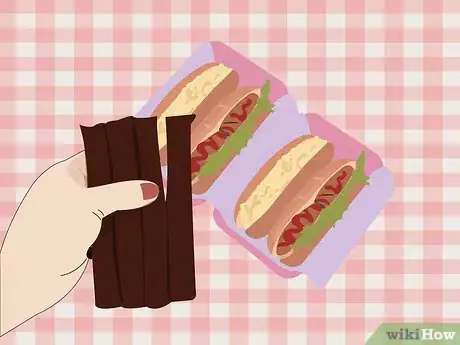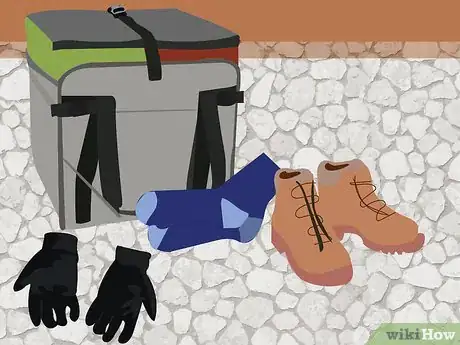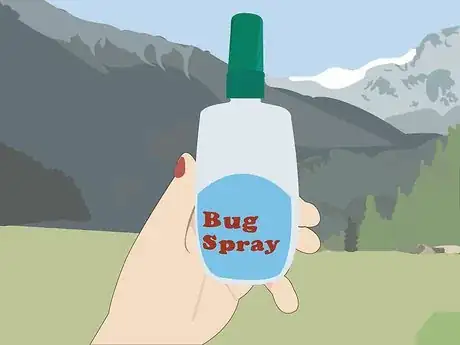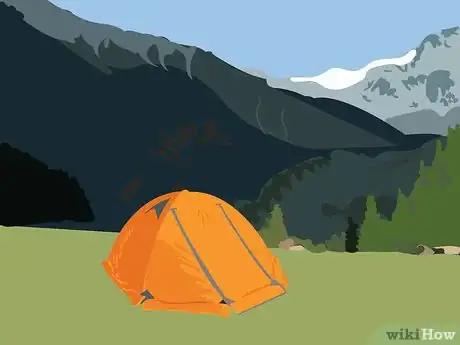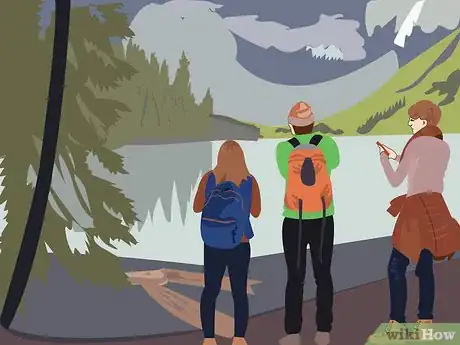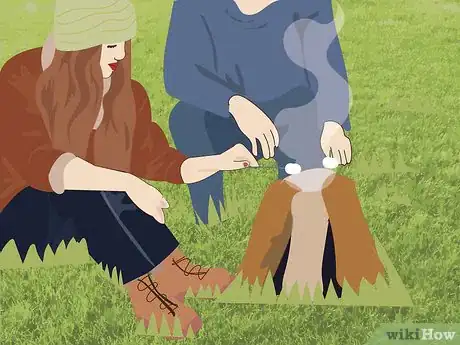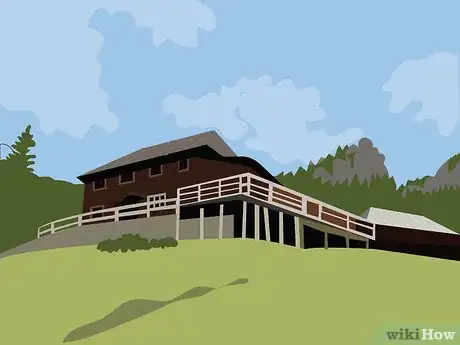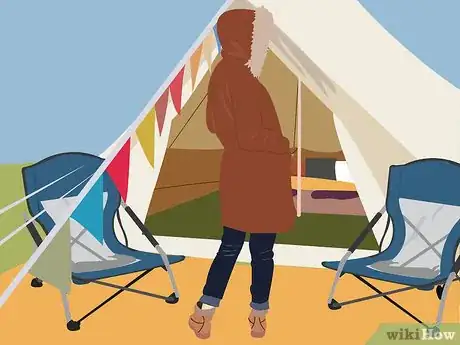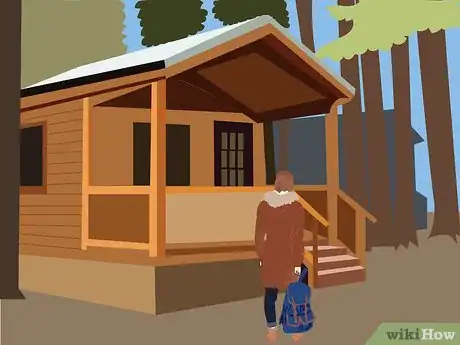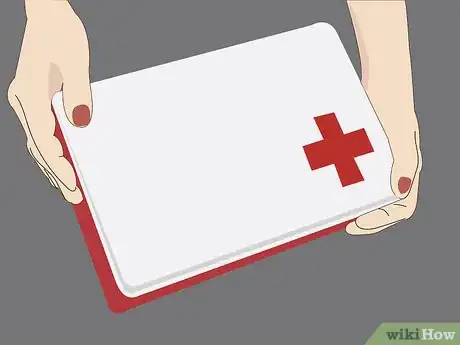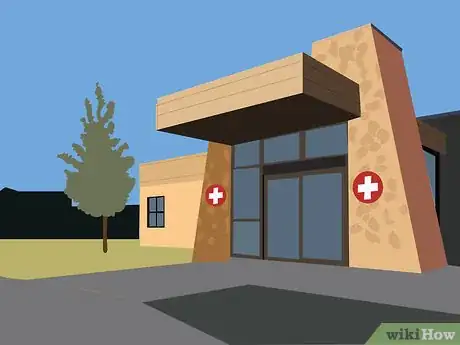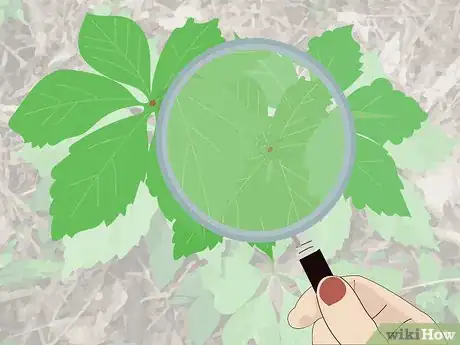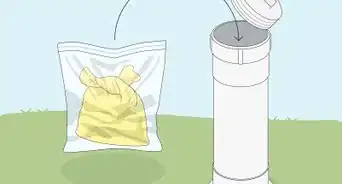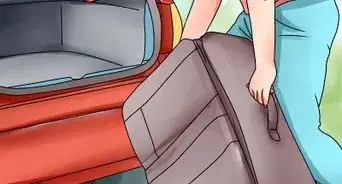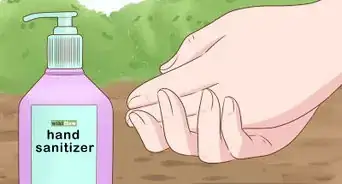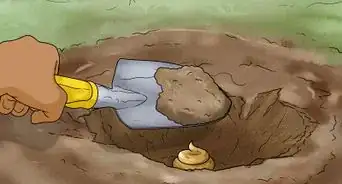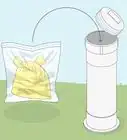This article was co-authored by High Mountain Institute. The High Mountain Institute is an educational organization dedicated to helping students connect with nature, develop as leaders, and discover education at its best. For over 25 years, HMI has taken students into the wilderness of Colorado and Patagonia and fostered communities of shared responsibility, thereby creating the foundation for rigorous intellectual experiences.
There are 24 references cited in this article, which can be found at the bottom of the page.
This article has been viewed 27,448 times.
Camping can be an inexpensive way to escape the stresses of our modern lives. Sleeping under the stars, hiking, and cooking over a campfire all offer ways to reconnect with nature and relax. But if thoughts of pitching a tent and building a campfire cause anxiety instead of bliss, your next camping trip could be a bust. In order to have a great time camping, it’s important to remember to prepare well, include activities you enjoy, and be safe.
Steps
Preparing to Go Camping
-
1Find a great location. If you’re a reluctant camper, you will definitely enjoy yourself more if you’re excited about where you choose to camp. Think about combining your camping trip with seeing a new part of the country or exploring a different habitat. Whether you want to be near the mountains or in the desert southwest, national parks offer varied opportunities for adventure.[1]
-
2Decide between a remote and a full service campsite. Many national parks offer campsites ranging from remote to full service. Remote, or backcountry, camping sites include few to no amenities like running water, electricity hookups, restrooms, or picnic tables.[4] Full service campgrounds typically offer flush toilets, parking spaces, grills, and picnic tables.Advertisement
-
3Select a good quality tent. Your tent will be your temporary home away from home, and if you choose well, you will enhance your camping experience.
- Consider choosing a tent with a larger capacity than you will actually need. This will give your more space and can be helpful if you don’t like closed spaces or if you move around a lot while sleeping.[7]
- Look at the weather forecast before you get a tent. If you are a new camper, a three-season tent, designed to be lightweight and good for camping in moderate conditions in the spring, summer, and fall, will probably suffice. If you will face harsher conditions, however, a four-season tent may be the right choice for you.[8]
- Bring a tarp to place under your tent to protect it from damp, soggy ground.
- Another useful item is a mat for your tent entrance to help keep down the amount of dirt tracked in to your outdoor home.
- Regardless of the type of tent you choose, you should be sure to bring along extra stakes for the tent, in case you have a problem with one.
-
4Pack the proper gear. You will definitely enjoy your camping experience more if you have everything you need to make your stay comfortable.
- Bring camp chairs, folding tables, and hammocks so you’re not stuck sitting on the ground.
- Extra blankets are good for wrapping up while around the campfire.
- Most camping problems are easily solved if you bring along tools and hardware like a hammer or axe, rope, matches, pocket knives, lanterns, and flashlights.[9]
- Other items that will help ensure your comfort and pleasure while camping include fire wood, toilet paper, paper towels, hand sanitizer, extra batteries, shower shoes and towels for bathing, and rain gear/umbrella.
-
5Pack items to ensure a good night’s sleep. Your camping experience will be enhanced if you remember a few simple items for sleeping well under the stars:
- Bring an air mattress, cot, or foam pad for under your sleeping bag. If you bring an air mattress, remember to bring your air pump as well.
- Remember your pillow. There are pillows specifically designed for camping, but many prefer to just bring their comfortable one from home.[10]
- Eyeshades and earplugs are also useful to help block out unfamiliar sounds or lights while sleeping in your tent.
-
6Bring along lots of tasty treats. Who says camping cuisine needs to be limited to beef jerky, hot dogs, and dehydrated soups? If you pack foods and drinks you enjoy, you’ll ensure that at least your palate is happy.
- Yogurt and granola are easy breakfast foods to bring, and bagels and muffins work well too.
- Bean salads, pasta salads, fruit salads, and gourmet sandwiches are easily packable and could make for a tasty lunch or light dinner.
- For dinner, you could bring items to cook over the campfire, like macaroni and cheese or Dutch oven lasagna. A quick Internet search will give you dozens of ideas.
- Bring lots of ice in a cooler to keep your food from spoiling.
- To keep food safe from foraging animals, odor-proof plastic bags or bear canisters are useful.[11]
-
7Take clothes that will counter the elements. Whether you’re camping in the heat of summer or facing rain or wind, having the proper clothes will make you more comfortable and ready to enjoy your outing.
- Proper footwear, like hiking boots or trail shoes, will keep you comfortable and safe on trails near your campsite. Be sure to pack a few extra pairs of wool socks, too. They’ll help prevent blisters, and extra socks will be welcome if you face wet conditions.[12]
- It’s good to think about layering when packing for camping. That way, you can remove or add layers depending on the conditions. If you’re comfortable, you are more likely to enjoy your campout.
- A hat and sunscreen will help keep the sun off of your face, and rain gear will keep you dry in inclement weather.
-
8Remember to bring bug spray. Having this essential item will increase your pleasure by helping you avoid itchy bites. Chemical bug repellents, like those containing DEET, are effective at deterring both mosquitos and ticks.[13]
- You could spray the outside of your tent with bug spray to deter mosquitos and other pests from bothering you while sleeping.
- Citronella candles are another helpful item for keeping pests at bay.[14]
- Although DEET has been declared safe by the Environmental Protection Agency, some still prefer “natural” bug repellents. Those containing oil of lemon eucalyptus have been found to be effective against mosquitos and ticks.[15]
-
9Bring sunscreen. Dermatologists recommend using a broad-spectrum sunscreen (which protects against both UVA and UVB rays) of at least SPF 30. Be sure the sunscreen is water resistant, since you may be sweating or swimming while camping.[16]
- While outside, reapply your sunscreen every two hours, and don’t forget areas like your lips, ears, and back of your hands.
Increasing Your Enjoyment
-
1Pick a great spot for your tent. Once you’ve arrived at your camp site, figuring out where to set up is your first challenge. Choose a generally flat area with good drainage. This will enable you to easily set up your tent and will help you sleep better knowing your tent won’t be flooded in the middle of the night.[17] Set up your tent about 75 paces away from any water sources to avoid polluting streams and rivers.
- If you are backcountry camping, rangers can offer useful advice on good areas to consider for setting up camp.[18]
- Look out for insect nests and slanted ground when setting up your tent. You will want to avoid both.
- Avoid setting up below or near a dead or dying tree, since limbs can break off during heavy winds.[19]
- Think about whether you want to be near restroom and shower facilities, for convenience, or away from them for privacy.
-
2Go camping with friends. If you are among people you enjoy spending time with, you will increase the odds of having a great time on your camping trip.
- You may want to just bring a few friends to your first camping trip, since it will be easier to plan for a smaller number.
- Another benefit of bringing friends along is that you can split up the gear and food that you’re bringing, so you each have to pack less. Just knowing that you have some help in the planning and preparation may help you have a better time while on your campout.
-
3Add in fun activities. Camping involves more than just sleeping in a tent. If you can think of ways to do things you enjoy on your campout, you will maximize your enjoyment.
- If you are a foodie and love to cook, think of all of the ways you can bring that enthusiasm to cooking over an open fire. The Internet is full of gourmet campfire recipes you can use to impress your friends. For example, you could make grilled chicken or a fire-roasted vegetable salad.[20]
- If you are a physical activity enthusiast, you have many options to increase your camping enjoyment. Hiking, biking, swimming, and boating are just a few of the activities you can partake in while on your camping trip.
- Nature lovers can have a great time while camping by incorporating bird watching or stargazing into their trip.
- If you need a break from the great outdoors, choose a campsite close to local attractions like historical sites or museums. That way, you get to do something you enjoy, while your camping partner gets to have fun too.
-
4Have some old-fashioned fun. At its core, camping is about the simple pleasure of slowing down and enjoying nature. You may be surprised how much fun you can have just relaxing and interacting with others.
- Tell ghost stories around the campfire while eating s’mores.
- Bring a guitar or other portable instrument and have a sing-along.
- Play hide-and-seek in the dark.
- Play card games.
- Catch fireflies.
Thinking Outside the Tent
-
1Stay in a cabin. From primitive to deluxe, cabins can offer you a way to slowly ease into the camping lifestyle. That way, you’ll get some basic comforts that you enjoy, and your fellow camper can experience the fun of the great outdoors.
- Tell your camping partner that you’re not ready yet for tent camping, but you are willing to start with cabin camping.
- Explain that you get the benefit of being with nature without the hassle of bringing along all of your equipment.
- Show your fellow camper the amenities offered at the cabin you’ve chosen. They can range from fireplaces to hot tubs.[21]
-
2Go glamping. High-end camping, or “glamping,” is becoming more popular, and it may be a way for you to really enjoy your camping experience.
- Options at glamping resorts range from staying in treehouses, to yurts, to multi-bedroom permanent “tents.”[22]
- Butlers, spa services, and fine dining are also common at glamping destinations.
-
3Look into lodges. Even though staying at a lodge is not technically camping, maybe you can convince your camping partner that it’s as close as you’re willing to get to camping for the moment.
- Many state and national parks offer lodges that can be rustic or deluxe.
- With amenities like swimming pools and game rooms, you’ll be able to enjoy some indoor activities while also being close to nature.
Staying Safe
-
1Bring a first aid kit. Knowing that you have some medical necessities in case of a cut or fall will make you feel more secure and ready to enjoy your campout:[23]
- Items to pack in your first aid kit include adhesive bandages, gauze pads, nonstick sterile pads, and medical tape. You should also include antiseptic wipes, antibacterial ointment, blister treatment, tweezers, and safety pins.
- Medications to include are ibuprofen or acetaminophen for pain relief, an antihistamine for allergic reactions, aloe vera gel for sunburn, poison ivy/poison oak treatment, and insect sting treatment.
- In case of a sprain or strain, elastic wraps and finger splints are also useful to include.
-
2Locate nearby hospitals or urgent care facilities. In case you have a more extreme accident, it is a good idea to know ahead of time the location of nearby medical facilities.
- Just knowing the information could help you relax and have a good time while camping.
- Make sure you also bring your insurance card or coverage information in case you need to go to the hospital.
-
3Leave contact information. Give a friend or neighbor your contact information. You can leave your cell number, along with a number of the camp site that you have selected. You will be at ease knowing that your whereabouts are known in case you get lost while hiking or have car trouble.
- Additionally, you won’t miss out on urgent news from home if you are easily able to be located and contacted.
-
4Find nearby hotels or motels in case of terrible weather. Even the most experienced campers sometimes face insurmountable storms or blizzards. If you plan ahead and have the locations of local options, you will be comfortable embarking on your camping trip.
- Many national and state parks offer cabins and lodges, which could be an option if you face bad weather.
- Often, camping sites are in recreational areas that have at least one motel or hotel nearby.
-
5Learn about poisonous plants/insects in the area. One concern of new campers is how to avoid poison ivy or spider bites. If this describes you, having the knowledge of what plants and insects to avoid could add to your enjoyment of your trip.
- Poison ivy is native to every U.S. state, except Alaska and Hawaii. It is characterized by its three pointed leaves that change color with the seasons. It can grow as a vine or as a bush.[24]
- Poison oak also has three leaves, but these leaves resemble oak tree leaves. It can grow as either a low shrub, such as in the eastern part of the country, or as a climbing vine on the West Coast.
- Poison sumac tends to grow in wet areas. It has smooth, not saw-toothed, leaves and red stems.[25]
- The black widow, characterized by red marks on the underside of its abdomen, is a poisonous spider found throughout the United States.[26]
- Another spider to watch out for is the brown recluse, which is brown with a dark violin-shaped mark on its head. It also has six, instead of the usual eight, eyes. Brown recluse spiders are most commonly found in southern and Midwestern states.
Community Q&A
-
QuestionCan I camp in the middle of nowhere and tell no one?
 Tom De BackerTop AnswererSure. There is little or no land in the world that doesn't belong to anyone, so there are always landowners to contend with, though they usually can't patrol all their lands 24/7. Just make sure you don't destroy any property, don't destroy any plant life, don't disturb wildlife. If you make a fire, you'll be much more easily detectable, but at the very least, practice absolute fire safety. Above all, leave absolutely no waste behind.
Tom De BackerTop AnswererSure. There is little or no land in the world that doesn't belong to anyone, so there are always landowners to contend with, though they usually can't patrol all their lands 24/7. Just make sure you don't destroy any property, don't destroy any plant life, don't disturb wildlife. If you make a fire, you'll be much more easily detectable, but at the very least, practice absolute fire safety. Above all, leave absolutely no waste behind. -
QuestionCan I spray my tent's surface with bug repellent to keep the little buggers out?
 ll The Enchanted Max llCommunity AnswerYou can, but it will not be very efficient since most flies comes in from the main entrance. Also, bug repellent could be washed away by rain and pollute the ground beneath your tent.
ll The Enchanted Max llCommunity AnswerYou can, but it will not be very efficient since most flies comes in from the main entrance. Also, bug repellent could be washed away by rain and pollute the ground beneath your tent. -
QuestionWhat about when you are camping and you are hot, so you get out of your blanket, but then you get cold?
 Community AnswerBring a blanket that is thin, or just a sleeping bag that isn't too thick or thin, keeping your temperature in balance.
Community AnswerBring a blanket that is thin, or just a sleeping bag that isn't too thick or thin, keeping your temperature in balance.
References
- ↑ https://www.nps.gov/findapark/index.htm
- ↑ http://ohiostateparks.reserveamerica.com/camping/kelleys-island-state-park/r/campgroundDetails.do?contractCode=OH&parkId=960070
- ↑ http://azstateparks.com/Parks/KACA/index.html
- ↑ https://www.nps.gov/grsm/planyourvisit/backcountry-camping.htm
- ↑ http://www.gocampingamerica.com/node/2736
- ↑ ,http://www.gocampingamerica.com/node/3528
- ↑ https://www.rei.com/learn/expert-advice/family-base-camping-tent.html
- ↑ https://www.rei.com/learn/expert-advice/family-base-camping-tent.html
- ↑ http://www.reserveamerica.com/outdoors/must-bring-camping-essentials.htm
- ↑ http://cupofjo.com/2015/07/how-to-camp-with-kids-family/
- ↑ http://scoutingmagazine.org/2015/04/tips-remember-animal-proofing-campsite/
- ↑ http://darlingmagazine.org/how-to-dress-for-a-camping-trip/
- ↑ http://www.consumerreports.org/cro/magazine-archive/2010/july/health/insect-repellent/overview/index.htm
- ↑ http://www.lovetheoutdoors.com/how-to-avoid-insects-and-other-bugs-when-camping/
- ↑ http://www.webmd.com/a-to-z-guides/features/safer-bug-spray-natural-bug-repellents#1
- ↑ https://www.aad.org/media/stats/prevention-and-care/sunscreen-faqs
- ↑ http://adventure.howstuffworks.com/outdoor-activities/hiking/5-tips-for-preparing-site-for-camping1.htm
- ↑ https://www.theoutbound.com/ryan-mckinney/10-tips-for-picking-the-best-campsite
- ↑ https://www.theoutbound.com/ryan-mckinney/10-tips-for-picking-the-best-campsite
- ↑ http://www.sunset.com/food-wine/kitchen-assistant/campground-cooking-recipes
- ↑ http://www.visitpa.com/pa-cabins
- ↑ http://www.travelchannel.com/interests/outdoors-and-adventure/articles/upscale-camping-in-the-us-and-canada
- ↑ https://www.rei.com/learn/expert-advice/first-aid-checklist.html
- ↑ http://www.webmd.com/allergies/treating-poison-ivy
- ↑ http://www.poison-ivy.org/poison-sumac
- ↑ https://www.cdc.gov/niosh/topics/spiders/types.html
